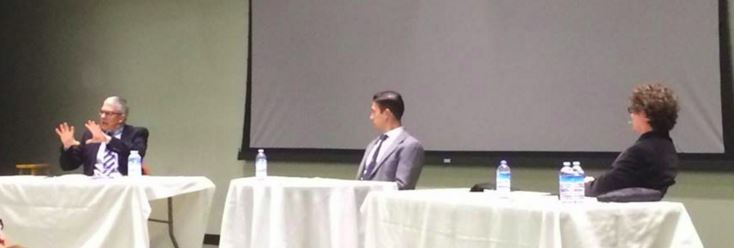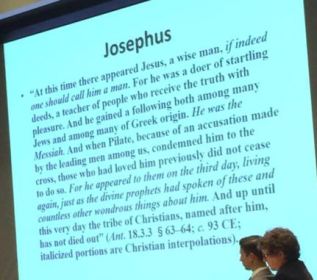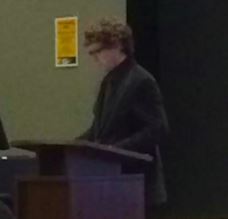 I had the privilege of attending last night’s debate on “Did Jesus Exist?” between two well-versed debaters – Dr. Craig Evans and Dr. Richard Carrier. When I learned of this debate, I wanted to take advantage of listening to Carrier, who is probably the world’s foremost mythicist scholar. In other words, I felt that this debate would expose me to the best arguments scholars could put forth suggesting Jesus was simply made up in history. Now I took plenty of apologetic classes in my undergraduate and graduate studies to become convinced of the overwhelming evidence regarding Jesus’ existence, but I could not pass up the chance to listen to Richard Carrier live. So I piled up my car with a few of my bright students and we took off to witness the debate.
I had the privilege of attending last night’s debate on “Did Jesus Exist?” between two well-versed debaters – Dr. Craig Evans and Dr. Richard Carrier. When I learned of this debate, I wanted to take advantage of listening to Carrier, who is probably the world’s foremost mythicist scholar. In other words, I felt that this debate would expose me to the best arguments scholars could put forth suggesting Jesus was simply made up in history. Now I took plenty of apologetic classes in my undergraduate and graduate studies to become convinced of the overwhelming evidence regarding Jesus’ existence, but I could not pass up the chance to listen to Richard Carrier live. So I piled up my car with a few of my bright students and we took off to witness the debate.
Here are some of my observations of last night’s event:
Evans’ Opening Statement
Craig Evans provided a well-rounded presentation with the typical Christian apologetic stance on Jesus’ existence. None of the arguments were new nor controversial. He noted that Paul and James (Jesus’ brother) were converted after the risen Jesus appeared to them.  Evans pointed out that Paul had conversed with Peter, one of the early disciples of Jesus. He also noted all of the early Greek and Latin authors who mentioned Jesus or who were aware of Jesus’ existence (Josephus, Tacitus, Pliny, Suetonius, Celcus, Lucian of Samosata, and Mara ben Serapion). Evans furthermore indicated that the four Gospels were written within a reasonable time from Jesus’ death to contain reliable information about him. I was actually impressed that Evans noted openly in his opening statement that the ‘Jesus passage’ in Josephus Antiquities 18 had indeed been doctored up by Christians. He gave this PowerPoint slide to note, in italics,
Evans pointed out that Paul had conversed with Peter, one of the early disciples of Jesus. He also noted all of the early Greek and Latin authors who mentioned Jesus or who were aware of Jesus’ existence (Josephus, Tacitus, Pliny, Suetonius, Celcus, Lucian of Samosata, and Mara ben Serapion). Evans furthermore indicated that the four Gospels were written within a reasonable time from Jesus’ death to contain reliable information about him. I was actually impressed that Evans noted openly in his opening statement that the ‘Jesus passage’ in Josephus Antiquities 18 had indeed been doctored up by Christians. He gave this PowerPoint slide to note, in italics,  which sections he felt were added. I applauded Evans for admitting this
which sections he felt were added. I applauded Evans for admitting this
honestly, although perhaps he was getting it on the table for discussion early, thinking that it would be heavily discussed (which it eventually was throughout the debate). All in all, Evans demonstrated that, at his age, he is sharp and well-versed in the Christian responses to historians and mythicists.
Carrier’s Opening Statement
Richard Carrier stuck me as a very eloquent speaker. He appeared very confident and was not afraid of being in the minority in regard to scholarship. I suppose taking a mythicist position requires you to develop thick skin. The first thing Carrier presented was basically that early Christianity was really no different than other pagan religions which honor a  dying and rising savior deity, albeit packaged into a Jewish form. I was struck at how he tended to take the position that if there was any possibility at explaining away the evidence for Jesus’ existence that it should be considered. Carrier did admit that it was plausible that Jesus historically existed, an admission which I found interesting coming from Carrier. I was disappointed that he dismissed the existence of Q, citing Mark Goodacre as one of the Christian scholars who does the same. Then things got interesting. Carrier suggested that Philo believed that an archangel was called ‘the firstborn son of God,’ the ‘image of God,’ and was depicted as God’s agent in creation in addition to being the celestial high priest. Then he cited Rom. 8:29; 2 Cor. 4:4; 1 Cor 8:6; and Heb. 4:14 to suggest that early Christians believed the very same things about Jesus. Of course there are different ways to interpret Jesus’ title of ‘firstborn’ and the meaning of 1 Cor. 8:6, but Carrier seemed adamant that his reading was the correct reading. He continued by noting that Mark, Matthew, and Luke, being the earliest Gospels, possessed a christology without preexistence. So far, so good (I thought). Then he suggested that these early Gospels had deliberately suppressed an early high christology of Paul, who, according to Carrier, believed and
dying and rising savior deity, albeit packaged into a Jewish form. I was struck at how he tended to take the position that if there was any possibility at explaining away the evidence for Jesus’ existence that it should be considered. Carrier did admit that it was plausible that Jesus historically existed, an admission which I found interesting coming from Carrier. I was disappointed that he dismissed the existence of Q, citing Mark Goodacre as one of the Christian scholars who does the same. Then things got interesting. Carrier suggested that Philo believed that an archangel was called ‘the firstborn son of God,’ the ‘image of God,’ and was depicted as God’s agent in creation in addition to being the celestial high priest. Then he cited Rom. 8:29; 2 Cor. 4:4; 1 Cor 8:6; and Heb. 4:14 to suggest that early Christians believed the very same things about Jesus. Of course there are different ways to interpret Jesus’ title of ‘firstborn’ and the meaning of 1 Cor. 8:6, but Carrier seemed adamant that his reading was the correct reading. He continued by noting that Mark, Matthew, and Luke, being the earliest Gospels, possessed a christology without preexistence. So far, so good (I thought). Then he suggested that these early Gospels had deliberately suppressed an early high christology of Paul, who, according to Carrier, believed and  taught that Jesus was an archangel who became incarnate in the human Jesus. He cited Phil. 2:5-11, which he repeatedly referred to throughout the debate, as the primary evidence for Jesus being a preexisting archangel (more on this later). He also suggested that angelos in Gal. 4:14 was best understood as an angel rather than a human messenger (as I would argue Paul intended). He then suggested that Jesus knew Moses according to 1 Cor. 10:4 (despite the fact that a few verses later Paul declared that he is speaking typologically). Carrier ended his opening statement by noting that early Christians spoke of resurrection appearances of Jesus in a way which he best felt are explained as ‘visions,’ visions which other pagan cults (ancient and modern) cite to validate their made up religious claims. In sum, Richard Carrier felt that Christianity is no different than other dying and rising savior deities in the ancient world.
taught that Jesus was an archangel who became incarnate in the human Jesus. He cited Phil. 2:5-11, which he repeatedly referred to throughout the debate, as the primary evidence for Jesus being a preexisting archangel (more on this later). He also suggested that angelos in Gal. 4:14 was best understood as an angel rather than a human messenger (as I would argue Paul intended). He then suggested that Jesus knew Moses according to 1 Cor. 10:4 (despite the fact that a few verses later Paul declared that he is speaking typologically). Carrier ended his opening statement by noting that early Christians spoke of resurrection appearances of Jesus in a way which he best felt are explained as ‘visions,’ visions which other pagan cults (ancient and modern) cite to validate their made up religious claims. In sum, Richard Carrier felt that Christianity is no different than other dying and rising savior deities in the ancient world.

Moderation
I was disappointed at the moderator of this debate, who seemed to be infatuated with the discussion taking place to the point of multiple times forgetting his moderating responsibilities. During the cross examination time, he never called Evans out when he spent three minutes making a rebuttal to Carrier which was not in the form of the question. Carrier was, however, polite and did not appear upset that the moderator was failing in his responsibilities. When it came time for audience Q&A, the moderator furthermore seemed unprepared of how the questions were to be asked and where the audience members were to form a line.
Audience Q&A
I do want to share the question which I asked both Carrier and Evans. I posed a challenge (at first to Carrier) that his argument regarding how the earliest christology was supposedly high, depicting Jesus as a former archangel according to Phil. 2:5-11. I read the Greek from Phil. 2:5-6a and asked what sense was Paul supposedly making to his Philippian converts if he expected them to “have this attitude among yourselves, which was also in Christ Jesus [Phil 2:5]” if Jesus used to be an archangel and, one day, decided to become a human? “How in the world,” I asked, “were Paul’s converts to imitate that attitude?”
Carrier responded to my question gracefully, but in a way which only proved my point of how Phil. 2:5-11 is to properly to be interpreted. Carrier admitted that Paul didn’t expect his audience to imitate Jesus becoming incarnate from an archangel, citing instead examples from Jesus’ human life which could realistically be modeled for Christian behavior. In sum, Carrier confusingly said that Paul argues in Phil. 2:5-11 that although Jesus was formerly an archangel, he does not expect his readers to “have this attitude among yourselves [Phil 2:5],” thus indicating that Paul commands something for his converts to do which he believes is impossible.
I grabbed the mic and asked Evans if he would mind responding. He told me rather casually that, “Well, I think he [Carrier] hit the nail right on the head.”
I rest my case.
I also wanted to share something funny which one of my students (Nathan) told me. During the scheduled break in the middle of the debate, Nathan was washing his hands in the bathroom and Carrier was washing his hands in the sink next to him. Nathan noted how short Carrier was and almost told him, “You are about the same height that the historical Jesus was – 5 foot 7!” But he didn’t. He told me afterwards and I laughed with him.
I still feel that the arguments for Jesus’ existence are strong and that Christianity is actually more different from the local cults of its times rather than being similar to them.

Just found your blog Dr. Smith and I love it. I am a big fan of James Dunn myself.
A question about your understanding of Philippians here. Does morphe theou indicate Jesus’ exalted status as a human being created by YHWH? Something akin to Psalm 8? Or does morphe theou specifically refer to Jesus’ status as king(one particularly chosen from among men)? Thanks
Hi Alex. Welcome to the blog.
μορφὴ translates the Aramaic צְלֵם in Dan 3:19 LXX, which is the equivalent to the Hebrew צֶ֫לֶם. This noun is used in Gen 1:27 (God created the human in his own ‘image’ – LXX εἰκών) – which has led some scholars to conclude that morphe theou is the equivalent to Adam functioning as the image of God. In short, it is a king, but it is the kingship role which Adam was originally given, one who ruled on God’s behalf. This is the sense of equality spoken of in Phil. 2:6b, I suggest – an equality of kingship’s authority.
Hullo! Alif from Britain here.
About your question on Philippians 2 please – and having the same mind-set/attitude φρονεῖτε.
As it hapns, the mindset/φρονεῖτε Paul is olredy discust a few verses above: in verse 2 φρονῆτε (and prior as in 2 cor 13.11) as well as later – Phil 3.15 and Col 3.2.
Paul here and elsewhere incourages and ixhorts xtians to hav the same humility / love / joy / unity / mindset and attitude &c. as in Christ. This is the majur theme in his letter(s).
It is very amateurish of you to suggest that imitating and having the same attitude as christ means ixpecting xtians to undertake incarnation. You might as well say that this is what Paul was trying to do when he said he was imitating Christ 1 cor 11.1
Verse 5 isn’t an introduction to verse 6. Rather, the incarnation unit of 2.6-11 – is a dramatic apostrophe as to *why* xtians should imitate or be “φρονῆτε” – Christ not *how*.
The mistake is to link v 5 to v 6, as u hav done, thereby giving an improper exegesis at which Carrier and Evans balk. Remember please the hymn is verses 6 to 11 – not 5 to 11.
Cheers
Alif
I was not suggesting that Christians engage in incarnation. That would be nonsensical. However, verse 5 is the introduction to 2:6-11, as the relative pronoun “os” indicates at the start of 2:6 and how 2:6 continues the sentence in Greek begun in 2:5.
Phil 2.1-5 are a unit – being of one mindset starts in verse 2.
Even in the English one can see that ὃς serves as a non-defining relative clause a sort of powerful flourish/coda as to why xtians ought to imitate Christ all the more in his humility.
By ankring φρονεῖτε with the following coda, it becomes question begging.
“if Jesus used to be an archangel and, one day, decided to become a human? “How in the world,” I asked, “were Paul’s converts to imitate that attitude?”
Easy. If a being greater than you all, says Paul, can empty/divest himself of such power and become a slave – how much more ought you to do the same.
There is nothing confusing about carrier’s reply. The confusion ensues because you ankr verse 5 with the hymn. dearie me.
Reblogged this on Talmidimblogging.
I don’t really follow the point of the question you asked–it seems easy to understand that the “same mindset” is one of humility, of being willing to lower oneself, etc. This is a theme we find in several places in Paul, in this particular passage, and in the later gospels as well so it’s a common early Christian trope.
My question stems from the exegesis of Phil. 2:5-11 which I feel does not place ‘Christ Jesus’ back in a preexistent state. Rather, it is showing the human Jesus in his earthly career who, instead of abusing his privileges, chose to empty himself in humility. This is something that the Philippian converts could actually grasp and imitate. To suggest that Jesus is a preexisting heavenly being who gave up that mode of reality in order to become human is something foreign to the audience’s thinking and would therefore be impossible for them to practically imitate. Paul similarly points to himself in 3:3-6 as one who had exemplary Jewish privileges but chose to count them as loss in order to imitate Jesus’ life and death. In Phil. 3:15 and 3:17 Paul again expects his audience to imitate his example, just as Paul told them earlier to imitate Jesus’ example. The example is one giving up privileges in this life, not emptying one’s self as a preexistent heavenly being.
But isn’t your analysis falsified by the documented existence (today and at many other times) of Christian sects which _do_ teach both that Christ was pre-existent _and_ that Christians should have the mindset of that pre-existent Christ?
I don’t have to think I was pre-existent to take the example of a pre-existent being humbling himself as an example for me to follow.
I don’t think so. Paul elsewhere regards Jesus to be the son of David and to have been born, thus disqualifying literal preexistence. Furthermore, the text itself is the basis upon which I am drawing my conclusions. Yes, Christian sects teach this and that, but I am primarily interested in what Paul most likely meant and how his original readers would have understood his epistle.
“To suggest that Jesus is a preexisting heavenly being who gave up that mode of reality in order to become human is something foreign to the audience’s thinking and would therefore be impossible for them to practically imitate.”
Given that Acts 11 tells us Lycaonians thought Barnabas and Paul himself were gods that became like men and came down to earth, how can your above statement be true? Even if you don’t believe Acts is historically accurate, it at least provides evidence that gods becoming incarnated was a known concept in the Greco-Roman world. Do you know of evidence that suggests the Phillipians would have thought differently?
Oops! I meant Acts 14:11, not acts 11.
Are you aware of anywhere where this debate can be viewed online? Most of these types of debates end up online at some point, but I can’t find this one.
I googled and couldn’t find it on video. It was videoed at KSU as they had two cameras. I would email Ratio Christi at KSU for more info.